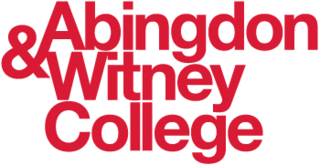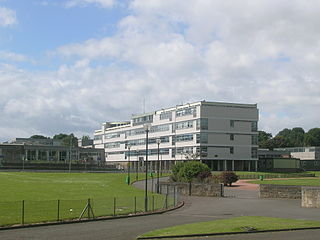
Vocational education is education that prepares people for a skilled craft. Vocational education can also be seen as that type of education given to an individual to prepare that individual to be gainfully employed or self employed with requisite skill. Vocational education is known by a variety of names, depending on the country concerned, including career and technical education, or acronyms such as TVET and TAFE. TVE refers to all forms and levels of education which provide knowledge and skills related to occupations in various sectors of economic and social life through formal, non-formal and informal learning methods in both school-based and work-based learning contexts. To achieve its aims and purposes, TVE focuses on the learning and mastery of specialized techniques and the scientific principles underlying those techniques, as well as general knowledge, skills and values.

West Lothian is one of the 32 council areas of Scotland, bordering the City of Edinburgh council area, Scottish Borders, South Lanarkshire, North Lanarkshire and Falkirk. The modern council area was formed in 1975 when the historic county of West Lothian, also known as Linlithgowshire, was reshaped substantially as part of local government reforms; some areas that had formerly been part of Midlothian were added to a new West Lothian District within the Region of Lothian, whilst some areas in the north-west were transferred to the Falkirk District and areas in the north-east were transferred to the City of Edinburgh District. In 1996 West Lothian became a unitary authority area, using the same name and territory as in 1975.
Further education in the United Kingdom and Ireland is additional education to that received at secondary school that is distinct from the higher education (HE) offered in universities and other academic institutions. It may be at any level in compulsory secondary education, from entry to higher level qualifications such as awards, certificates, diplomas and other vocational, competency-based qualifications through awarding organisations including City and Guilds, Edexcel (BTEC) and OCR. FE colleges may also offer HE qualifications such as HNC, HND, foundation degree or PGCE. The colleges are also a large service provider for apprenticeships where most of the training takes place at the apprentices' workplace, supplemented with day release into college.
Education in Scotland is provided in state schools, private schools and by individuals through homeschooling. Mandatory education in Scotland begins for children in Primary 1 (P1) at primary school and ends in Fourth Year (S4) at secondary school. Overall accountability and control of state–education in Scotland rests with the Scottish Government, and is overseen by its executive agency, Education Scotland, with additional responsibility for nursery schools being the joint responsibility of both Education Scotland and the Care Inspectorate. Scotland's private schools are overseen by the Scottish Council of Independent Schools. Children in Scotland sit mandatory National Standardised Assessments in Primary 1 (P1), Primary 4 (P4), Primary 7 (P7) at the end of primary school, and Third Year (S3) in secondary school, which assist in monitoring children's progress and providing diagnostic data information to support teachers' professional judgement.

The Scottish Qualifications Authority is the executive non-departmental public body of the Scottish Government responsible for accrediting educational awards. It is partly funded by the Education, Communities and Justice Directorates of the Scottish Government, and employs approximately 750 staff based in Glasgow and Dalkeith.

The Association of Accounting Technicians (AAT) is a UK-headquartered, global professional body for accounting technicians and bookkeepers, as well as a major provider of finance and accounting qualifications in the UK.
A Scottish Vocational Qualification, or SVQ, is a certificate of vocational education in Scotland. SVQs are available to people of all ages. SVQs are developed by Sector Skills Councils, in partnership with industry and awarding bodies. After the SSC has developed the SVQ structure, awarding bodies can develop the full SVQ and then seek to have the SVQ accredited by the Accreditation Unit of the Scottish Qualifications Authority (SQA). SVQs can be awarded by an awarding body, once the awarding body has been approved by SQA Accreditation.

West Cheshire College was a further education, vocational college in the North West of England. It had over 20,000 students at its two main campuses in Ellesmere Port and Chester as well as in workplaces and community venues. In March 2017 it was merged with South Cheshire College, based in Crewe, to form Cheshire College – South & West, which as of 2020 retains the Ellesmere Port and Chester campuses.

Grimsby Institute of Further & Higher Education and University Centre Grimsby is a further education college, and higher education university in Grimsby in North East Lincolnshire in England.
The BTECLevel 3 diploma is a Further Education qualification and vocational qualification taken in England, Wales and Northern Ireland. The qualification is organised and awarded by Pearson within the BTEC brand and it is equivalent to A-Levels. It is equivalent to the GCE A Levels, more specifically to three A2 awards and the AVCE.

Selby College is a tertiary college, offering A Level courses through its Sixth Form Academy, work-related vocational courses, apprenticeships, business training and adult education courses. It is located in Selby, North Yorkshire, England. The College is a provider of A levels and vocational education for sixteen to eighteen year olds. Selby provides apprenticeships, higher education including foundation degrees, honours degrees and HND/HNC level qualifications as well as workforce training.

Abingdon & Witney College is a further education provider established in April 2001 after the merger of Abingdon College and West Oxfordshire College. It has four campuses: Abingdon, Witney, Common Leys Farm and a new Construction Skills Centre in Bicester.

Train to Gain (T2G) was a UK government-funded initiative to deliver vocational training to employed adults. It was discontinued in 2010.
In the UK education sector, there are a wide range of qualification types offered by the United Kingdom awarding bodies. Qualifications range in size and type, can be academic, vocational or skills-related, and are grouped together into different levels of difficulty. In England, Wales and Northern Ireland, qualifications are divided into Higher Education qualifications, which are on the Framework for Higher Education Qualifications (FHEQ) and are awarded by bodies with degree awarding powers, and Regulated qualifications, which are on the Regulated Qualifications Framework (RQF) and are accredited by Ofqual in England, the Council for the Curriculum, Examinations and Assessment in Northern Ireland and Qualifications Wales in Wales. In Scotland, qualifications are divided into Higher Education qualifications, Scottish Qualifications Authority qualifications and Scottish Vocational Qualifications/Modern Apprenticeships, which are on the Scottish Credit and Qualifications Framework (SCQF). Scottish Higher Education Qualifications are on both the SCQF and the FHEQ.

West Suffolk College is a Further Education college in Bury St Edmunds, Suffolk. The college delivers a range of courses, including vocational and technical courses, apprenticeships, and an array of higher-apprenticeships and bachelor's degree courses accredited by the University of East Anglia. Over 12,000 students are enrolled at West Suffolk College.

The Department for Education (DfE) is a ministerial department of the Government of the United Kingdom. It is responsible for child protection, child services, education, apprenticeships, and wider skills in England.

Edinburgh College is a further and higher education institution with campuses in Edinburgh and Midlothian, Scotland. It serves the Edinburgh Region, Edinburgh, East Lothian and Midlothian, and is the largest college in Scotland. It was formed on 1 October 2012 as part of the merger of Edinburgh's Jewel and Esk, Telford, and Stevenson colleges. The college has four campuses, all of which were previously the campuses of the constituents of the merger: Jewel and Esk's College Milton Road (Jewel) Campus and Eskbank Campus ; Edinburgh Telford College ; and Stevenson College Edinburgh

Secondary education in Scotland can take up to 6 years, covering ages 11 to 18, from S1 to S6. Education is not compulsory after the age of 16, the age of majority in Scots law.
T Levels are technical-based qualifications in England, developed in collaboration with employers and businesses, with content that meets the needs of industry and prepares students for work, further training, or study.
Apprenticeships have a long tradition in the United Kingdom, dating back to around the 12th century. They flourished in the 14th century and were expanded during the Industrial Revolution. In modern times, apprenticeships were formalised in 1964 by act of parliament and they continue to be in widespread use to this day.














